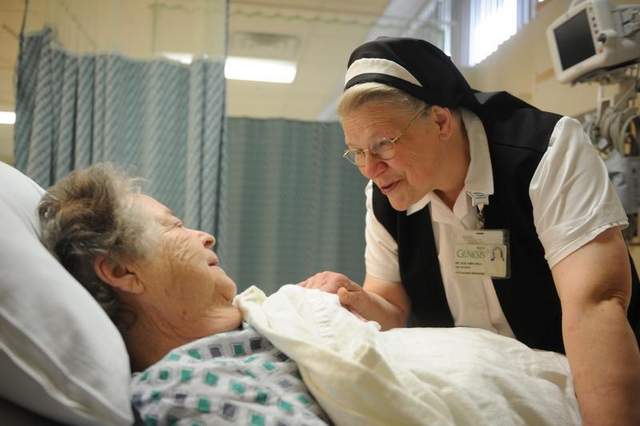Franciscan Sister of Christian Charity Sister Kathleen Murphy reflects on Pope Francis’ February Prayer Intention “that those with a terminal illness, and their families, receive the necessary physical and spiritual care and accompaniment.” ‘ The ‘Just Gospel’ blog post each month reflects on Pope Francis’ Prayer Intention and includes any other specific focus of our religious community for the year.
In the early 18th century Katharina Amalia Dorothea von Schlegel wrote the now familiar lyrics to the hymn Be Still My Soul.
Be still my soul the Lord is on thy side
Bear patiently the cross of grief or pain
Leave to thy God to order and provide
In every change He faithful will remain.
Be still my soul thy best, thy heavenly friend
Through thorny ways leads to a joyful end.
These comforting words relate well to Pope Francis’ intention for February. He asks us to pray that those with a terminal illness, and their families, receive the necessary physical and spiritual care and accompaniment.
This intention leads to taking a look at some healthcare terms. One has become rather familiar and one perhaps remains rather new. There terms are hospice care and palliative care. Information from the Catholic Healthcare Association will help us to understand these areas of care. Palliative care and hospice care are not the same. Hospice care is a specific type of palliative care for patients who are not expected to live longer than six months. Hospice care focuses on relieving pain, providing comfort-oriented medical treatments along with emotional and spiritual support. Hospice is only for patients with a serious illness who are not expected to live longer than six months.
The goals of palliative care are to:
- Control pain
- Manage symptoms such as fatigue, shortness of breath, nausea, trouble sleeping, loss of appetite
- Ensure treatments are consistent with the patient’s values and wishes
- Coordinate care across medical teams and specialists for serious illness and other chronic conditions
- Offer spiritual and emotional support to patients and their families experiencing stress, anxiety or depression
- Provide comfort and care when a cure is no longer possible and the end of life is approaching.
Palliative care neither hastens death nor uses unnecessary measures to postpone it, recognizing that dying is a normal part of life
Contemporary palliative medicine grew out of the hospice movement of care for the dying. In the early 1970s, Dr. Balfour Mount coined the term “palliative care” as a means of providing all around care for any patient during a serious illness. Most insurance plans, including Medicare and Medicaid, cover all or part of palliative care.
One may wonder about the Church’s stance on these kinds of care. The Catholic bishops’ Ethical and Religious Directives for Catholic Health Care Services explain that “patients should be kept as free of pain as possible”. Over the years, Popes from Saint John Paul II to Francis have written positively about palliative care. In his address to the Pontifical Academy of Life in 2015, Pope Francis said: Palliative care is an expression of the truly human attitude of taking care of one another, especially of those who suffer. It is a testimony that the human person is always precious, even if marked by illness and old age. Indeed, the person, under any circumstances is an asset to him/herself and to others and is loved by God. This is why, when their life becomes very fragile and the end of their earthly existence approaches, we feel the responsibility to assist and accompany them in the best way.
In addition to praying for those suffering from terminal illness and their families, it is good for us to keep informed as to government funding for such home health programs as hospice and palliative care. Bill Dombi, president of the National Association for Home Care & Hospice comments on recent cuts in funding: Certainly, any reduction in revenues from home health will make it much harder to implement new programs such as palliative care or to participate in innovations such as hospice. In some circumstances, lower home health revenues may lead to the use of hospice revenues to subsidize other programs, rather than to continue to invest in hospice improvements such as technologies, or to begin palliative care programs.
In faithful prayer with Pope Francis we return to von Schlegel’s lyrics:
Leave to thy God to order and provide
In every change He faithful will remain.


